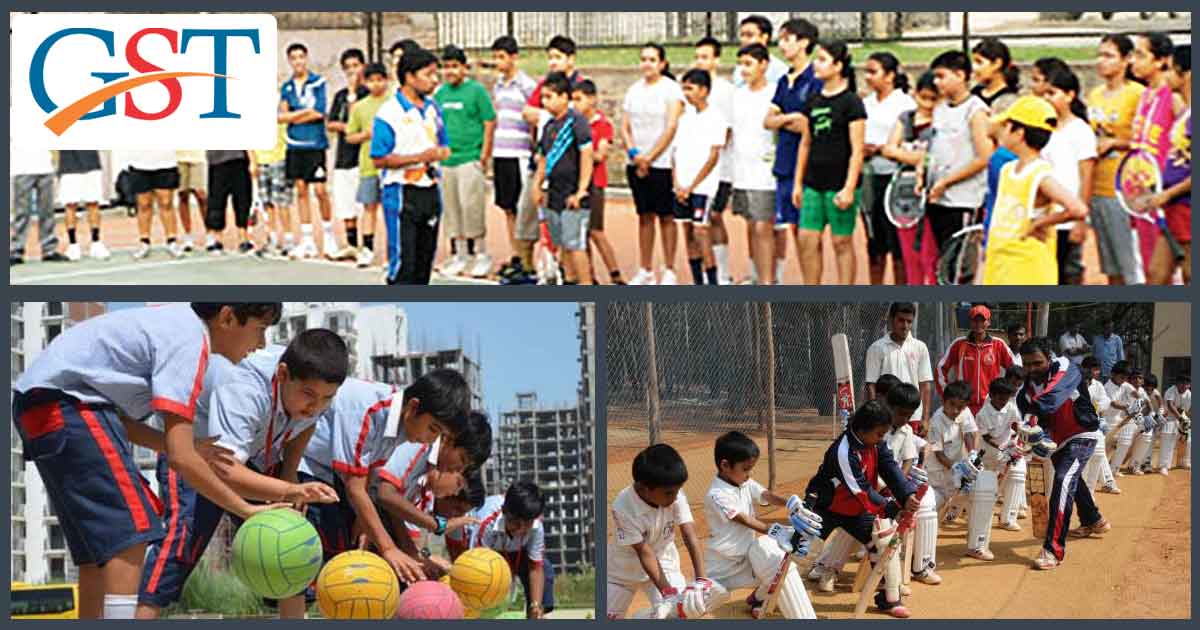India is a hub of sports-loving people. Whether it’s cricket or athletics, we are always excited to watch our favourite players and encourage them to win. We have a potential to grow in sports and to represent our country at international level.
The PM Narendra Modi also explained in speeches many times, he said at the inauguration function of the Usha School of Athletics In Kerala, “India has huge potential in sports. It is a sports-loving country. We have no shortage of talent. But we need to provide the right kind of opportunity and create an ecosystem to nurture the talent. A strong sporting culture can help the growth of a sporting economy.” Lucky we are that our sports sector in safe hands with such a great leader who understands the importance of the sector.
Here are the basic points about Sports sector and the impacts of GST on Sports sector:
Professional Training is Necessary
Gone are the days when it was possible to crack through the international level without much of practice. Nowadays, you not only need talent but also the guidance from an experienced to grow in this sector. To reach the level of international competition, it is very important to get professional sports training. As the training programme for advanced learning are always there in the country, but a complete organized service of sports in India requires the roots to be strong or we can say a complete preparation of sports from the entry level/school level is necessary.
Analysing the sports gap, many sports training centres started maintaining professional sports education in collaboration with schools to catch and grow the talented sports players from an early age.
Read Also: GST Slab Rates in India 2017 Finalized by the GST Council
GST Impacts on Sports Sector
When the sports sector started growing and the boom of sports had taken place, the GST implementation has changed everything. After GST implementation, the sports sector which was out of service tax liability came into the ambit of the tax net. The sports sector now attracts 18% GST and it has ruined on the very foundations where the sector just rooted to groom.
The burden of 18% GST tax has distracted the schools from thinking to provide sports education. Under GST regime, school is not liable to get input tax credits. So they are not left with an option to charge higher fees to accommodate with the paid taxes. Apart from this, the states have put the cap to regulate the fee of private schools and the schools don’t have various sources to recover the taxes paid on sports education.
The GST has put the brakes on the sound transfer of thoughts between the schools and professional training centres. The most distressing apart from tax imposition on sports is that many of the sectors are put out of the tax bracket.
The neglection of the sports sector will reduce the participation in sports activities by students and schools as schools are not capable to provide improved infrastructure.
It can Increase the Health Issues in Students
Presently, many of the school-going kids are suffering from obesity and other health-related problems. The sports is the way to improve the physical and mental health of kids. The GST is aimed to create a united nation but leaving behind the unfit nation.
Instead of improving the sports sector, it has run over the existing sporting culture in India as pursuing sports culture will become expensive.
Recommended: Why Steel Industry Thinks It is Doing Samaj Seva after GST?
Increased Manufacturing Cost of Sports Equipment
As the sports sector is put in the tax net of 18% and goods manufacturing industry is put into the tax net of 12%-28%. The parallel effects of goods manufacturing industry will make the price increase of sports equipment and it will increase the purchase cost for youngsters.
Subsequently, this change in tax system put many questions on the objective of the government. The new change is not expected by Indian as it will eliminate the basic root of sports from school-level sports education and discourage the entrepreneurs who put their heart and soul to build the strong base of players in India. By the heavy tax imposition on entry-level sports sector, India is lacking somewhere to achieve the international sporting accolades.
Sports Items Prices Increased after GST Implementation
Just after the implementation of goods and services tax, it has been a dark night for the sales of sports equipment and related items. According to the survey performed by the Traders Association of Sporting Goods and Physical Exercise Equipment (TASGPEE) the sales decline is around 50 to 60 percent of overall sales. The fitness equipment sales have been in the downward position starting from the onset of GST in the nation on 1st July 2017. The survey was conducted by the means of 67 fitness equipment retails and 250 potential fitness equipment customers from around the nation.
The sports types of equipment attract GST in the range of 12 to 28 and basis of it many of the retailers and manufacturers of sports items and physical exercise equipment sorted for reclassification of items into sports goods which can help the entire range of products to come under lesser 12 percent GST bracket.









